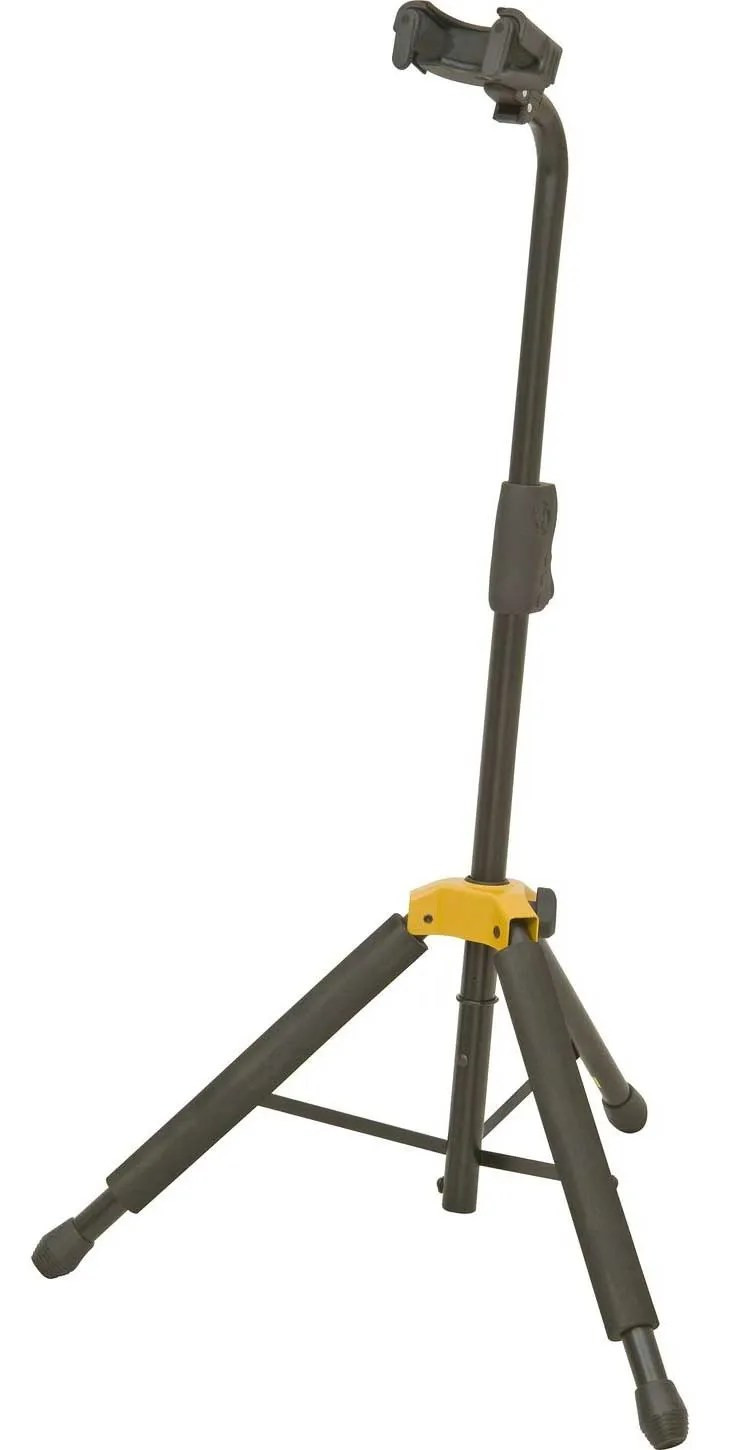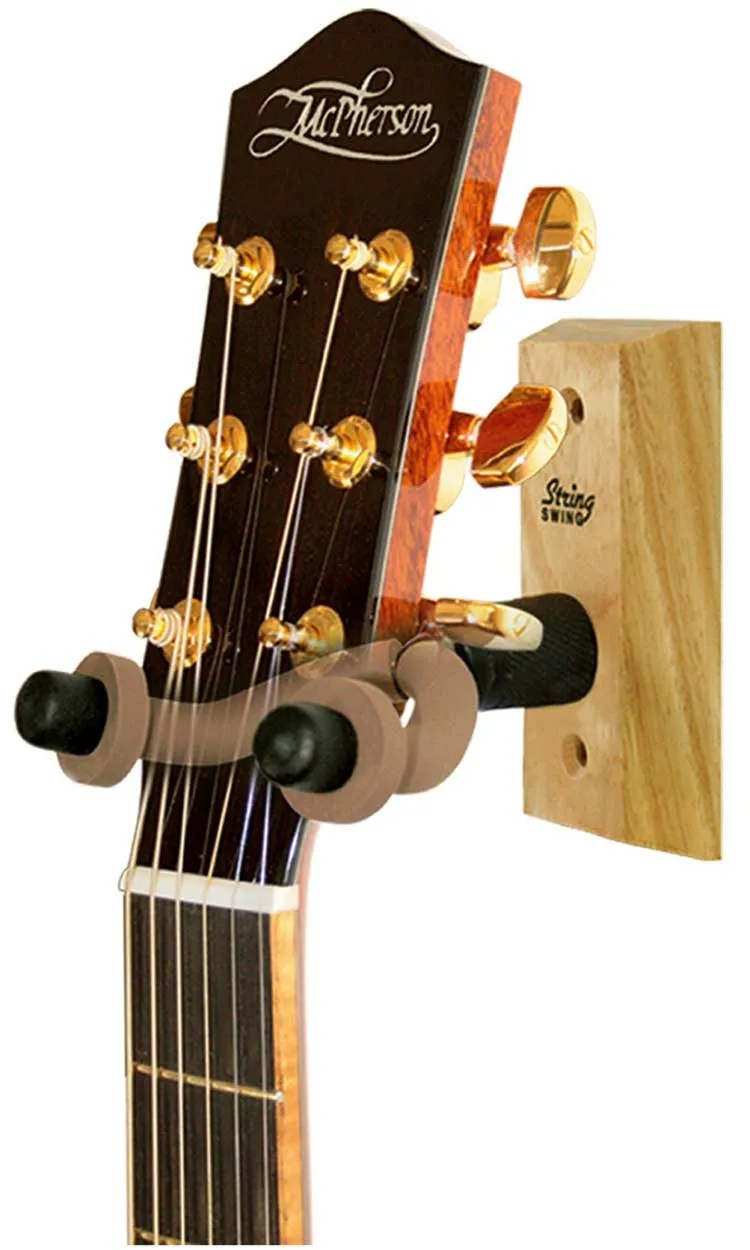Storing your acoustic guitar properly is crucial for maintaining its condition, playability, and longevity. Whether you’re a seasoned musician or a beginner, understanding the best storage practices will protect your investment and ensure your guitar is always ready to play. At [Your Acoustic Guitar Store Name – Placeholder], we not only offer a wide selection of acoustic guitars but also provide expert advice and premium storage solutions. This guide will walk you through the essential methods for storing your acoustic guitar, whether at home, in the studio, or while traveling, ensuring it remains in top condition.
Cases: The Fort Knox for Your Acoustic Guitar
 Acoustic guitar in a hard case
Acoustic guitar in a hard case
Generally, a high-quality hardshell case is the safest haven for your acoustic guitar. Forget flimsy gig bags or ill-fitting chipboard cases – a robust hardshell case offers superior protection against physical damage. If you own multiple guitars, avoid stacking them. Instead, store them vertically, side-by-side, using a guitar case rack for optimal organization and safety. For horizontal storage, heavy-duty shelving units are suitable, ensuring you don’t exceed the shelf’s weight limit. Remember, each guitar in its case can weigh between 12–15 pounds.
Don’t assume cases are impenetrable fortresses. String tension can still pose a threat even when cased. Richard Hoover of Santa Cruz Guitars explains how string tension can lead to a cascade of issues, from raised action to potentially fatal instrument distortion.
For short-term storage (weeks or months), slightly loosen the strings – about half to a whole step down. For long-term storage, drastically reduce tension, just enough to keep components like the nut and bridge in place. For guitars with a single-acting truss rod, neutralize its position for long storage to simplify adjustments later.
Climate control is equally critical. Store cased guitars away from external walls, attics, and direct heat sources. Humidity is a major factor; consider cases with built-in humidifiers and hygrometers, like some Ameritage models. Alternatively, D’Addario’s Humiditrak, available at many acoustic guitar stores, offers Bluetooth monitoring of humidity levels inside the case. Soundhole humidifiers like the Kyser Lifeguard are also effective but require regular checks to prevent over-humidification, which can be as damaging as dryness.
Richard Johnston from Gryphon Stringed Instruments recalls a cautionary tale of a valuable vintage guitar ruined by a leaking soundhole humidifier, highlighting the importance of vigilance.
For bulk humidity control, especially for larger guitar collections, consider humidifying the entire room. Room humidifiers or even a simple bowl of water in a closet can help. For serious collectors, a whole-house humidifier integrated with your HVAC system is a worthwhile investment, offering consistent, hassle-free climate control and mold prevention, as Paul Heumiller of Dream Guitars advises.
Floor Stands: Guitars at the Ready
 Acoustic guitar in a hard case
Acoustic guitar in a hard case
Floor stands are popular for immediate access and flexible placement in any room or studio. Acoustic guitar stores offer a variety of stands: A-frame, tubular, tripod, multi-stands, and racks.
A-frame stands are budget-friendly and portable, ideal for travel. However, their non-adjustable nature makes them less stable. Upgraded A-frames, like the On-Stage Professional Flip It, offer enhanced security with adjustable neck supports.
Tripod stands are generally the most secure floor option. Brands like On Stage, Ultimate Support, and Hercules Stands provide reliable tripod stands, some with self-closing neck yokes for added security. Richard Johnston at Gryphon recommends Hamilton hangers for their stability, noting their ability to withstand accidental bumps.
Wooden stands offer a more aesthetically pleasing alternative to metal stands, though typically at a higher price point. Companies like Take a Stand craft beautiful, customizable wooden stands from premium hardwoods, available at select acoustic guitar stores or directly from the manufacturer.
For multiple guitars, consider multi-guitar stands or racks. Gator Frameworks offers economical double and triple stands, while Hercules provides robust versions of their GS414B stands in double and triple configurations, often found at reputable acoustic guitar stores.
Guitar racks are space-saving solutions, especially for smaller rooms. Hercules GS523B and GS525B racks hold multiple guitars securely. However, their side-loading design might be less visually appealing for display purposes.
When choosing any stand or rack, ensure the contact points are finish-safe, especially for nitrocellulose lacquer finishes. Paul Heumiller warns against cheap stands causing damage to guitar finishes. Even with safe padding, consider adding soft cotton covers for extra protection. New stands might release plasticizers harmful to lacquer, so regular removal of the guitar from a brand-new stand is advisable initially, as Johnston suggests.
Wall Hangers: Display and Protection Combined
 String Swing guitar wall hanger
String Swing guitar wall hanger
Wall hangers are excellent for homes with pets or children, keeping guitars out of reach and serving as attractive displays. String Swing Guitar Keepers are popular, cost-effective wall hangers, available individually or in multi-guitar versions. Paul Heumiller emphasizes the aesthetic appeal of wall-mounted guitars as “beautiful wall art.”
Installation requires careful mounting into wall studs, drywall toggles, or masonry screws for brick or concrete. If you’re not experienced with such installations, professional help is recommended to avoid accidents, especially with valuable instruments, as Johnston cautions against improper drywall mount installations.
For the ultimate display and protection, consider guitar cabinets or display cases. American Music Furniture creates custom, high-end wooden cabinetry with tempered glass doors, often seen in boutique acoustic guitar stores. These can range from single-guitar wall-hanging cabinets to large freestanding enclosures with features like humidity control and LED lighting. Acoustic Remedy also offers climate-controlled single display cases in solid hardwoods. These premium options are ideal for serious collectors looking to showcase and safeguard their prized instruments.
Creative and Budget-Friendly Guitar Storage
Looking for unconventional storage solutions? Repurposing old furniture, like 1980s entertainment centers, is a clever, budget-friendly approach. Bryan Galloup suggests sealing the doors, adding humidity control, and dividers to create a DIY guitar cabinet from readily available free furniture.
For maximum security, especially against theft and fire, a safe is a robust option. Used rifle safes, found on sites like Craigslist, can securely store multiple guitars in their cases.
For extreme discretion, some guitar owners even build hidden compartments like fake walls in closets, as mentioned by Richard Johnston.
However, remember that overly secure or concealed storage can reduce playing frequency. Johnston points out that easy access is key to enjoying your guitars. If retrieving and tuning your guitar becomes a lengthy process, you’re less likely to play it. Balance security with accessibility to maximize your musical enjoyment.
Find Your Ideal Storage Solution at [Your Acoustic Guitar Store Name – Placeholder]
At [Your Acoustic Guitar Store Name – Placeholder], we understand the importance of proper guitar storage. Visit us today to explore our wide range of cases, stands, wall hangers, and humidity control solutions. Our expert staff can help you choose the perfect storage method to protect your acoustic guitar and keep it ready for your next musical inspiration. Invest in the longevity of your instrument – explore our storage options and keep your guitar in perfect harmony.

